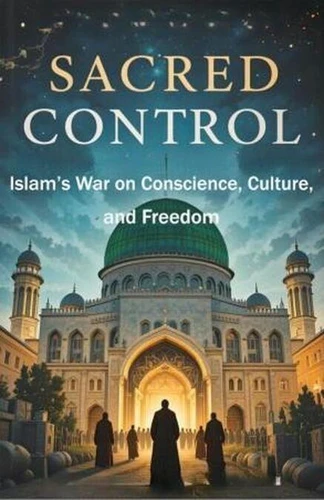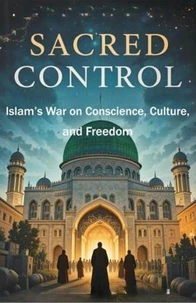- Accueil /
- Bilal
Bilal

Dernière sortie
Sacred Control: Islam’s War on Conscience, Culture, and Freedom
Sacred Control: Islam's War on Conscience, Culture, and Freedom is a sweeping, uncompromising indictment of Islamic theology-not as a misunderstood religion, but as a system of sacred authoritarianism that weaponizes obedience, erases indigenous cultures, and reprograms moral agency. It is not merely a critique of doctrine, but a confrontation with the psychological, historical, and legal machinery that has enabled Islam to function as both a theology and a tool of conquest.
The book argues that Islam, in its classical and legal form, does not elevate the soul-it subjugates it. And the West, once the critic of sacred tyranny, has become its curator, silencing dissent in the name of pluralism and betraying its own legacy of conscience. At the heart of this work is a radical reappraisal of Islamic theology's moral architecture. The Qur'an and Hadith do not invite ethical reflection-they demand submission.
Goodness is not discerned through conscience but decreed by divine command. The believer is not called to wrestle with moral complexity but to obey without question. Acts of violence-such as wife-beating, stoning, and apostasy executions-are not aberrations but sanctified duties. The theology does not merely permit these acts; it prescribes them. This architecture breeds moral paralysis, outsourcing conscience to scripture and punishing introspection as heresy.
Islam, in this framing, does not guide the soul-it programs it. But the critique extends beyond theology into the realm of cultural conquest. Islam, the book argues, does not coexist with other civilizations-it consumes them. From the destruction of temples in India to the erasure of Pharaonic memory in Egypt, Islamic expansion has historically operated as a civilizational overwrite. Indigenous languages, dress, rituals, and histories are not merely marginalized-they are condemned as idolatrous and systematically replaced.
Arabic becomes the sacred tongue. Arabian tribal figures become the new ancestors. The conquered are taught to forget who they were before Islam told them who to be. This process is not only physical but psychological. The book details how Islamic conquest perfected the art of humiliation-using rape, forced conversion, and public executions to spiritually cripple communities. Women bonded with captors to survive.
Men were emasculated, unable to protect their families. These were not incidental cruelties; they were strategic methods of domination. Islam did not just conquer lands-it rewrote the soul. The conquered were not merely subdued-they were reprogrammed to enforce their own subjugation. This collaboration is not accidental-it is ideological. In the name of pluralism, the West has abandoned its moral clarity.
It defends submission as cultural authenticity, and condemns critique as bigotry. It quotes the Qur'an while forgetting its own prophets. It praises modesty while ignoring mutilation. It promotes tolerance while silencing victims. This is not pluralism-it is theological amnesia. The West has not merely misunderstood Islam-it has curated it, sanitized it, and weaponized its silence against those who dare to speak. "We are not Arabs.
Our gods were not theirs. Our stories were not born in the desert. And our memory will not be erased." "Until the lions have their own historians, the history of the hunt will always glorify the hunter." - African Proverb "The sand beneath our feet is soaked with the blood of our ancestors. We may have forgotten them, but they have not forgotten us. Their memory lingers in the land, in the silence between prayers, in the stories we were never taught.
And though buried by conquest and creed, they will guide us still-until the day their voice rises again, and we remember who we were before we were told who to be."
The book argues that Islam, in its classical and legal form, does not elevate the soul-it subjugates it. And the West, once the critic of sacred tyranny, has become its curator, silencing dissent in the name of pluralism and betraying its own legacy of conscience. At the heart of this work is a radical reappraisal of Islamic theology's moral architecture. The Qur'an and Hadith do not invite ethical reflection-they demand submission.
Goodness is not discerned through conscience but decreed by divine command. The believer is not called to wrestle with moral complexity but to obey without question. Acts of violence-such as wife-beating, stoning, and apostasy executions-are not aberrations but sanctified duties. The theology does not merely permit these acts; it prescribes them. This architecture breeds moral paralysis, outsourcing conscience to scripture and punishing introspection as heresy.
Islam, in this framing, does not guide the soul-it programs it. But the critique extends beyond theology into the realm of cultural conquest. Islam, the book argues, does not coexist with other civilizations-it consumes them. From the destruction of temples in India to the erasure of Pharaonic memory in Egypt, Islamic expansion has historically operated as a civilizational overwrite. Indigenous languages, dress, rituals, and histories are not merely marginalized-they are condemned as idolatrous and systematically replaced.
Arabic becomes the sacred tongue. Arabian tribal figures become the new ancestors. The conquered are taught to forget who they were before Islam told them who to be. This process is not only physical but psychological. The book details how Islamic conquest perfected the art of humiliation-using rape, forced conversion, and public executions to spiritually cripple communities. Women bonded with captors to survive.
Men were emasculated, unable to protect their families. These were not incidental cruelties; they were strategic methods of domination. Islam did not just conquer lands-it rewrote the soul. The conquered were not merely subdued-they were reprogrammed to enforce their own subjugation. This collaboration is not accidental-it is ideological. In the name of pluralism, the West has abandoned its moral clarity.
It defends submission as cultural authenticity, and condemns critique as bigotry. It quotes the Qur'an while forgetting its own prophets. It praises modesty while ignoring mutilation. It promotes tolerance while silencing victims. This is not pluralism-it is theological amnesia. The West has not merely misunderstood Islam-it has curated it, sanitized it, and weaponized its silence against those who dare to speak. "We are not Arabs.
Our gods were not theirs. Our stories were not born in the desert. And our memory will not be erased." "Until the lions have their own historians, the history of the hunt will always glorify the hunter." - African Proverb "The sand beneath our feet is soaked with the blood of our ancestors. We may have forgotten them, but they have not forgotten us. Their memory lingers in the land, in the silence between prayers, in the stories we were never taught.
And though buried by conquest and creed, they will guide us still-until the day their voice rises again, and we remember who we were before we were told who to be."
Sacred Control: Islam's War on Conscience, Culture, and Freedom is a sweeping, uncompromising indictment of Islamic theology-not as a misunderstood religion, but as a system of sacred authoritarianism that weaponizes obedience, erases indigenous cultures, and reprograms moral agency. It is not merely a critique of doctrine, but a confrontation with the psychological, historical, and legal machinery that has enabled Islam to function as both a theology and a tool of conquest.
The book argues that Islam, in its classical and legal form, does not elevate the soul-it subjugates it. And the West, once the critic of sacred tyranny, has become its curator, silencing dissent in the name of pluralism and betraying its own legacy of conscience. At the heart of this work is a radical reappraisal of Islamic theology's moral architecture. The Qur'an and Hadith do not invite ethical reflection-they demand submission.
Goodness is not discerned through conscience but decreed by divine command. The believer is not called to wrestle with moral complexity but to obey without question. Acts of violence-such as wife-beating, stoning, and apostasy executions-are not aberrations but sanctified duties. The theology does not merely permit these acts; it prescribes them. This architecture breeds moral paralysis, outsourcing conscience to scripture and punishing introspection as heresy.
Islam, in this framing, does not guide the soul-it programs it. But the critique extends beyond theology into the realm of cultural conquest. Islam, the book argues, does not coexist with other civilizations-it consumes them. From the destruction of temples in India to the erasure of Pharaonic memory in Egypt, Islamic expansion has historically operated as a civilizational overwrite. Indigenous languages, dress, rituals, and histories are not merely marginalized-they are condemned as idolatrous and systematically replaced.
Arabic becomes the sacred tongue. Arabian tribal figures become the new ancestors. The conquered are taught to forget who they were before Islam told them who to be. This process is not only physical but psychological. The book details how Islamic conquest perfected the art of humiliation-using rape, forced conversion, and public executions to spiritually cripple communities. Women bonded with captors to survive.
Men were emasculated, unable to protect their families. These were not incidental cruelties; they were strategic methods of domination. Islam did not just conquer lands-it rewrote the soul. The conquered were not merely subdued-they were reprogrammed to enforce their own subjugation. This collaboration is not accidental-it is ideological. In the name of pluralism, the West has abandoned its moral clarity.
It defends submission as cultural authenticity, and condemns critique as bigotry. It quotes the Qur'an while forgetting its own prophets. It praises modesty while ignoring mutilation. It promotes tolerance while silencing victims. This is not pluralism-it is theological amnesia. The West has not merely misunderstood Islam-it has curated it, sanitized it, and weaponized its silence against those who dare to speak. "We are not Arabs.
Our gods were not theirs. Our stories were not born in the desert. And our memory will not be erased." "Until the lions have their own historians, the history of the hunt will always glorify the hunter." - African Proverb "The sand beneath our feet is soaked with the blood of our ancestors. We may have forgotten them, but they have not forgotten us. Their memory lingers in the land, in the silence between prayers, in the stories we were never taught.
And though buried by conquest and creed, they will guide us still-until the day their voice rises again, and we remember who we were before we were told who to be."
The book argues that Islam, in its classical and legal form, does not elevate the soul-it subjugates it. And the West, once the critic of sacred tyranny, has become its curator, silencing dissent in the name of pluralism and betraying its own legacy of conscience. At the heart of this work is a radical reappraisal of Islamic theology's moral architecture. The Qur'an and Hadith do not invite ethical reflection-they demand submission.
Goodness is not discerned through conscience but decreed by divine command. The believer is not called to wrestle with moral complexity but to obey without question. Acts of violence-such as wife-beating, stoning, and apostasy executions-are not aberrations but sanctified duties. The theology does not merely permit these acts; it prescribes them. This architecture breeds moral paralysis, outsourcing conscience to scripture and punishing introspection as heresy.
Islam, in this framing, does not guide the soul-it programs it. But the critique extends beyond theology into the realm of cultural conquest. Islam, the book argues, does not coexist with other civilizations-it consumes them. From the destruction of temples in India to the erasure of Pharaonic memory in Egypt, Islamic expansion has historically operated as a civilizational overwrite. Indigenous languages, dress, rituals, and histories are not merely marginalized-they are condemned as idolatrous and systematically replaced.
Arabic becomes the sacred tongue. Arabian tribal figures become the new ancestors. The conquered are taught to forget who they were before Islam told them who to be. This process is not only physical but psychological. The book details how Islamic conquest perfected the art of humiliation-using rape, forced conversion, and public executions to spiritually cripple communities. Women bonded with captors to survive.
Men were emasculated, unable to protect their families. These were not incidental cruelties; they were strategic methods of domination. Islam did not just conquer lands-it rewrote the soul. The conquered were not merely subdued-they were reprogrammed to enforce their own subjugation. This collaboration is not accidental-it is ideological. In the name of pluralism, the West has abandoned its moral clarity.
It defends submission as cultural authenticity, and condemns critique as bigotry. It quotes the Qur'an while forgetting its own prophets. It praises modesty while ignoring mutilation. It promotes tolerance while silencing victims. This is not pluralism-it is theological amnesia. The West has not merely misunderstood Islam-it has curated it, sanitized it, and weaponized its silence against those who dare to speak. "We are not Arabs.
Our gods were not theirs. Our stories were not born in the desert. And our memory will not be erased." "Until the lions have their own historians, the history of the hunt will always glorify the hunter." - African Proverb "The sand beneath our feet is soaked with the blood of our ancestors. We may have forgotten them, but they have not forgotten us. Their memory lingers in the land, in the silence between prayers, in the stories we were never taught.
And though buried by conquest and creed, they will guide us still-until the day their voice rises again, and we remember who we were before we were told who to be."
Les livres de Bilal
Nouveauté


